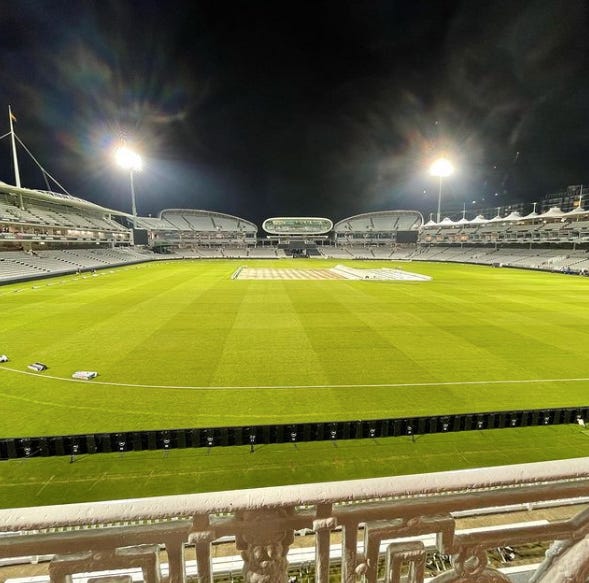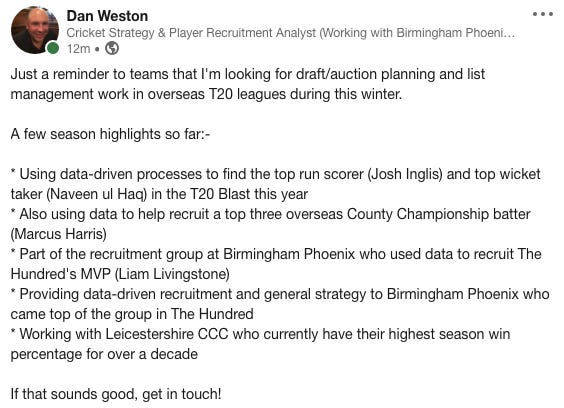As most readers will know, I was recently working with the Birmingham Phoenix at The Hundred, on the road with the team for the best part of the month providing data-driven strategy advice. Before the tournament, I also worked intensively on strategies surrounding draft planning, recruitment and retention, so it’s fair to say that I was pretty invested in the success of both Birmingham Phoenix as a team, but also The Hundred as a tournament.
The project to build a team to compete both in the first edition and in tournaments beyond year one took almost 2.5 years between first discussions and our first match against London Spirit, with Covid obviously scuppering the efforts to play in the 2020 season. The time scale also removed our ability to field our three original picks as overseas players, and wreaked havoc with a lot of teams squads - not just ours.
I think this is a worthwhile point to focus on. Some critics of The Hundred said that a lower quality of overseas players was a negative, but I don’t agree. In the current times, teams have to be flexible with hastily organised international cricket and frequent changes to the Future Tours Programme, and I don’t think you can level any criticism at the tournament for circumstances beyond its control - the quality of overseas was pretty high (but just perhaps lacking in reputation, and anyone who has seen any of my previous work will know I don’t care one iota about reputation). Anyway, I was delighted with the performances of our overseas trio, with Adam Milne’s pace bowling a real highlight. I’m not sure if there was an award for bowler of the tournament but if he didn’t win it, it would be a real travesty.
I want to move now on to some of my own personal experiences. Firstly, and quickly, it was an incredible experience overall, and I feel that the learnings taken from spending a month in the company of guys like Dan Vettori and Ian Bell have helped me leave the tournament a better analyst than when I started. I’m sure the situation was the same for the players too, and all that can only be good for English cricket. If players leave the tournament better than when they started, and analysts/coaches leave the tournament better than when they started, it can only be a positive for our domestic game. Critics of The Hundred have clearly missed this point from their agenda.
Secondly, and this is far more important to me, it’s given me more confidence in my beliefs. Anyone who has followed me on Twitter or read any of my articles would know that I’m not shy of challenging conventional ‘wisdom’, and being able to run strategies, or ideas, past world-class players and coaches during the tournament and them saying ‘actually, you’re spot on’ gives me even more belief in my approaches.
It wasn’t always like this throughout the tournament though. We got rolled for 90 odd against Manchester Originals on a raging turner at Old Trafford in match two and then lost a tight match where we missed the cutoff at Southampton against Southern Brave. We were one from three at that point, and I must admit there was a point where I thought ‘maybe all these ex-players who I’ve called out for making bad decisions have got it all right and I’m the guy who is wrong’. I shouldn’t have thought like that - after all, I had already recruited the top run scorer and wicket takers in the Blast this year for Leicestershire, and we have the highest win percentage for this season at Leics for a decade, but I’m sure every human being has a weak moment of self doubt from time to time. I reckon anyone who doesn’t is a liar.
Following this, though, in the group stage, we smashed it. It was incredible to see the team we had set out to build - a team of intent machines, to use a vogue phrase - do what we recruited them to do. Smash as many boundaries as possible. There were a few matches where we hit 27% boundaries as a team, and through those last five group matches, all of which we won, we hit over 20% in every single one. We finished the group stage with the highest team boundary percentage, and the highest six percentage, and from comments on social media, I know we were a fun team to watch. After every match I did a Twitter search for ‘Birmingham Phoenix’ and to see the comments and pictures of families having a great time watching us hopefully will inspire a few people to take up cricket and be the next generation of players. They might be inspired to hit sixes like Liam Livingstone, Moeen Ali and Will Smeed, as opposed to block like England’s top three in Test cricket, but I’m fine with that - it’s the way the game is going.
However, as Billy Beane once said though, ‘this shit doesn’t work in the playoffs’. Of course, I’m joking here. But the thought did cross my mind. We lost the final and to say that hurt was an understatement. I thought - and numbers backed me up - that we were the best team in the group stages by a long way, but one-off finals are a variance rollercoaster. Anyway, Southern Brave were better on the day, no doubt about that, and I thought Tymal Mills in particular was exceptional. If he doesn’t get a World Cup call up, particularly considering the mediocre quality of the England bowling group, it would be absurd.
After the game, I sat on the balcony at Lord’s for 10-15 minutes just taking everything in. All the spectators had left, and I sat there, not really thinking about much but thinking how we could improve for next season. I took a photo so I could remember that moment for a long time, and it will serve as inspiration moving forward. I’ll probably get it framed at some point and put it in my office to remind me of that hurt and to inspire me to keep pushing on with trying to be better than the rest.
Moving on from the tournament, I want to chat a bit more about something I tweeted about this week.
Following Danny Ings’ goal for Aston Villa last weekend, their head coach Dean Smith credited the set piece analyst with the goal. Analysis has previously shown that each goal in the Premier League is worth in excess of £1m, so it’s probably pretty reasonable to think that the set piece analyst has paid for himself time and time again with that contribution.
That’s a good example of a broader point - Analysts are cheap. In fact, they’re not just cheap. They’re dirt cheap. A fringe/squad player who plays less than 5-10% of matches (probably without a positive points per game contribution) will be paid far more, in various sports, than an analyst who often will much much more of a positive points per game contribution. In football, a recruitment analyst could make a team fortunes, but is probably paid a pittance. Almost certainly, less than £100k per year. In cricket, a similar situation exists. Would a 1 Crore (about £100k) overseas squad player in the IPL have more of an impact on their team’s PPG than a really good analyst? I doubt it.
This opens up all sorts of opportunities to smart, forward thinking teams. If a ‘super analyst’ exists in sport who can increase a team’s expected points per game by 10%, teams should be fighting for them. They should be paid fortunes, because their quality dictates that market forces imply that there should be a bidding war for their services. As far as I know, this doesn’t happen in football (I’d be amazed if there were analysts on million pound plus salaries) and to the best of my knowledge, it doesn’t happen in cricket, but as teams gets smarter and look for lower-cost, high reward edges compared to investing in overpriced players, they should work it out eventually. As you might expect, I’m looking forward to that moment.
In the meantime, I’m waiting. I posted this picture below on social media yesterday, so any teams who want to invest in my services, please get in touch via email.





Great stuff Dan, congratulations on your success. Inspirational to those who love the game but want to understand what actually drives success / winning. Looking forward to reading more of your work. Couldn't agree more re: the value of analytics; unbelievable value for money.